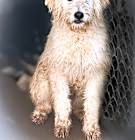Color
White
Size
(when grown) Large 61-100 lbs (28-45 kg)
Details
Good with kids
Good with dogs
Not good with cats
Spayed or Neutered
Shots are up-to-date
Story
4/1/2025
PLEASE NOTE: If after reading the biography below, you are interested in adopting, you MUST email animalprayers@gmail.com to request an application. . Because we are a small rescue and the number of inquiries we receive are high, we will not be able to answer any further questions until an application is submitted. Thank you for your understanding.
Ivy is a sweet and shy, approximately 10 month old Komondor puppy, also known as a Hungarian sheepdog, who was given up to rescue from a breeder who was overwhelmed. She is confused with her recent transition but is more and more affectionate every day as she comes out of her shell.
If you are interested in adopting Ivy, please email animalprayers@gmail.com to request an application.











